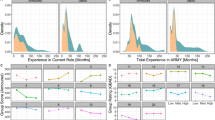Abstract
Cognitive Neurophysiologic synchronies (NS) are a low level data stream derived from EEG measurements that can be collected and analyzed in near real time and in realistic settings. We are using NS to develop systems that can rapidly determine the functional status of a team with the goals of being able to assess the quality of a teams’ performance / decisions, and to adaptively rearrange the team or task components to better optimize the team. EEG-derived measures of engagement from Submarine Piloting and Navigation team members were normalized and pattern classified by self-organizing artificial neural networks and hidden Markov models. The temporal expression of these patterns were mapped onto team events and related to the frequency of team members’ speech. Standardized models were created using pooled data from multiple teams and were used to compare NS expression across teams, training sessions and levels of expertise. These models have also been incorporated into software systems that can provide for rapid (minutes) after training feedback to the team and provide a framework for future real-time monitoring.
Chapter PDF
Similar content being viewed by others
References
Warner, N., Letsky, M., Cowen, M.: Cognitive Model of Team Collaboration: Macro-Cognitive Focus. In: Proceedings of the 49th Human Factors and Ergonomics Society Annual Meeting, Orlando, FL, September 26-30 (2005)
Salas, E., Cook, N.J., Rosen, M.A.: On Teams, Teamwork, and Team Performance: Discoveries and Developments. Human Factors: The Journal of the Human Factors and Ergonomics Society 50(3), 540–547 (2008)
Stevens, R.H., Galloway, T., Berka, C., Sprang, M.: Can Neurophysiologic Synchronies Be Detected during Collaborative Teamwork? In: Proceedings: HCI International 2009, San Diego, CA, July 19-24, pp. 271–275 (2009)
Stevens, R.H., Galloway, T., Berka, C., Behneman, A.: A Neurophysiologic Approach for Studying Team Cognition. Interservice / Industry Training Simulation and Education Conference (I/ITSEC), Paper No. 10135 (2010)
Berka, C., Levendowski, D.J., Ramsey, C.K., Davis, G., Lumicao, M.N., Stanney, K., Reeves, L., Regli, S., Tremoulet, P.D., Stibler, K.: Evaluation of an EEG-Workload Model in an Aegis Simulation. In: Proceedings of the SPIE Defense and Security Symposium, Biomonitoring for Physiological and Cognitive Performance during Military Operations (2005)
Levendowski, D.J., Westbrook, P., Berka, C., et al.: Event-related potentials during a psychomotor vigilance task in sleep apnea patients and healthy subjects. Sleep 25, A462-A463 (2002)
Stevens, R.H., Galloway, T.L., Berka, C.: Allocation of time, EEG-Engagement and EEG-Workload as scientific problem solving skills are acquired. In: Proceeding Human Factors and Ergonomics Society, 51st Annual Meeting, Baltimore, MD, October 1-5 (2007)
Soller, A., Stevens, R.: Applications of Stochastic Analyses for Collaborative Learning and Cognitive Assessment. In: Hancock, G., Samuelson, K. (eds.) Advances in Latent Variable Mixture Models. Information Age Publishing (2007)
Shannon, C.E.: Prediction and entropy of printed English. The Bell System Technical Journal 30, 50–64 (1951)
Stevens, R.H., Galloway, T., Berka, C., Behneman, A.: Temporal sequences of neurophysiologic synchronies can identify changes in team cognition. In: Proceedings: Human Factors and Ergonomics Society 54th Annual Meeting, San Francisco, CA, September 27-October 1, pp. 190–194 (2010c)
Author information
Authors and Affiliations
Editor information
Editors and Affiliations
Rights and permissions
Copyright information
© 2011 Springer-Verlag Berlin Heidelberg
About this paper
Cite this paper
Stevens, R.H., Galloway, T., Berka, C., Wang, P. (2011). Developing Systems for the Rapid Modeling of Team Neurodynamics. In: Schmorrow, D.D., Fidopiastis, C.M. (eds) Foundations of Augmented Cognition. Directing the Future of Adaptive Systems. FAC 2011. Lecture Notes in Computer Science(), vol 6780. Springer, Berlin, Heidelberg. https://doi.org/10.1007/978-3-642-21852-1_42
Download citation
DOI: https://doi.org/10.1007/978-3-642-21852-1_42
Publisher Name: Springer, Berlin, Heidelberg
Print ISBN: 978-3-642-21851-4
Online ISBN: 978-3-642-21852-1
eBook Packages: Computer ScienceComputer Science (R0)




